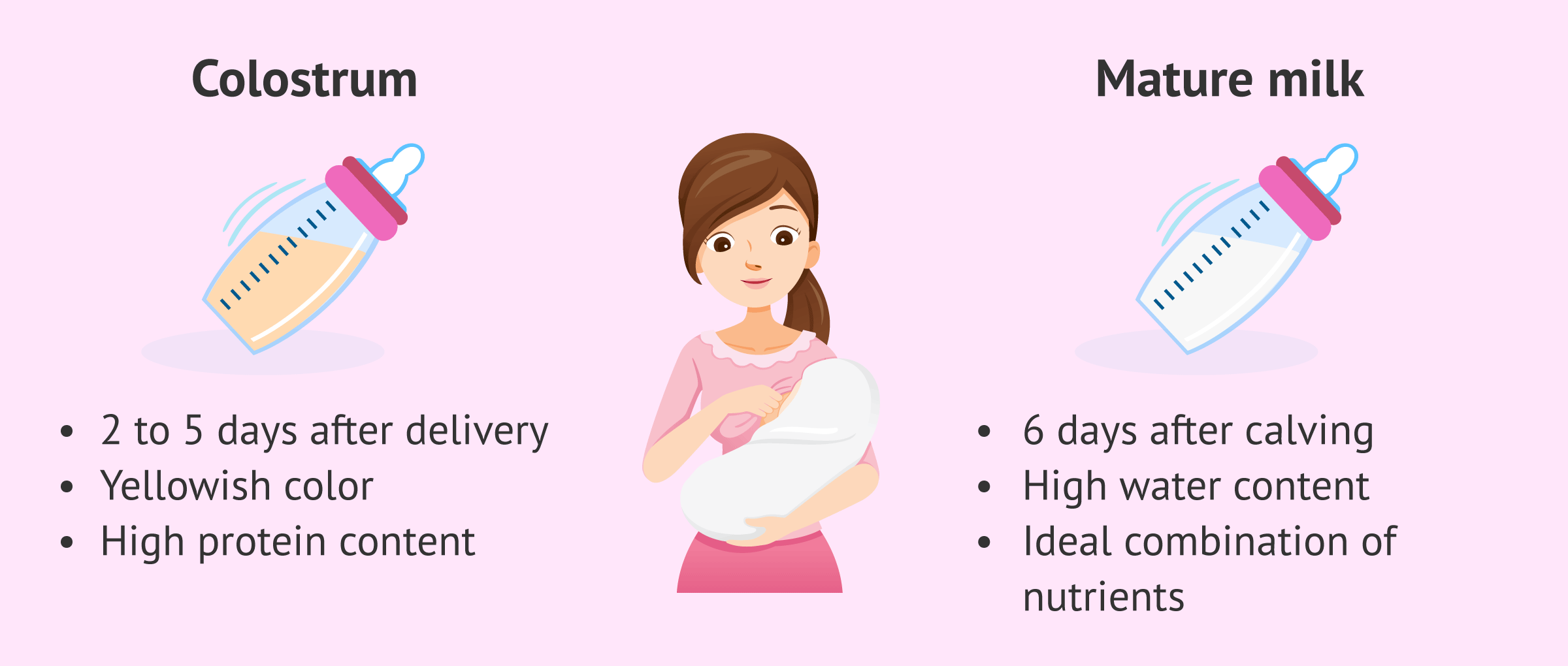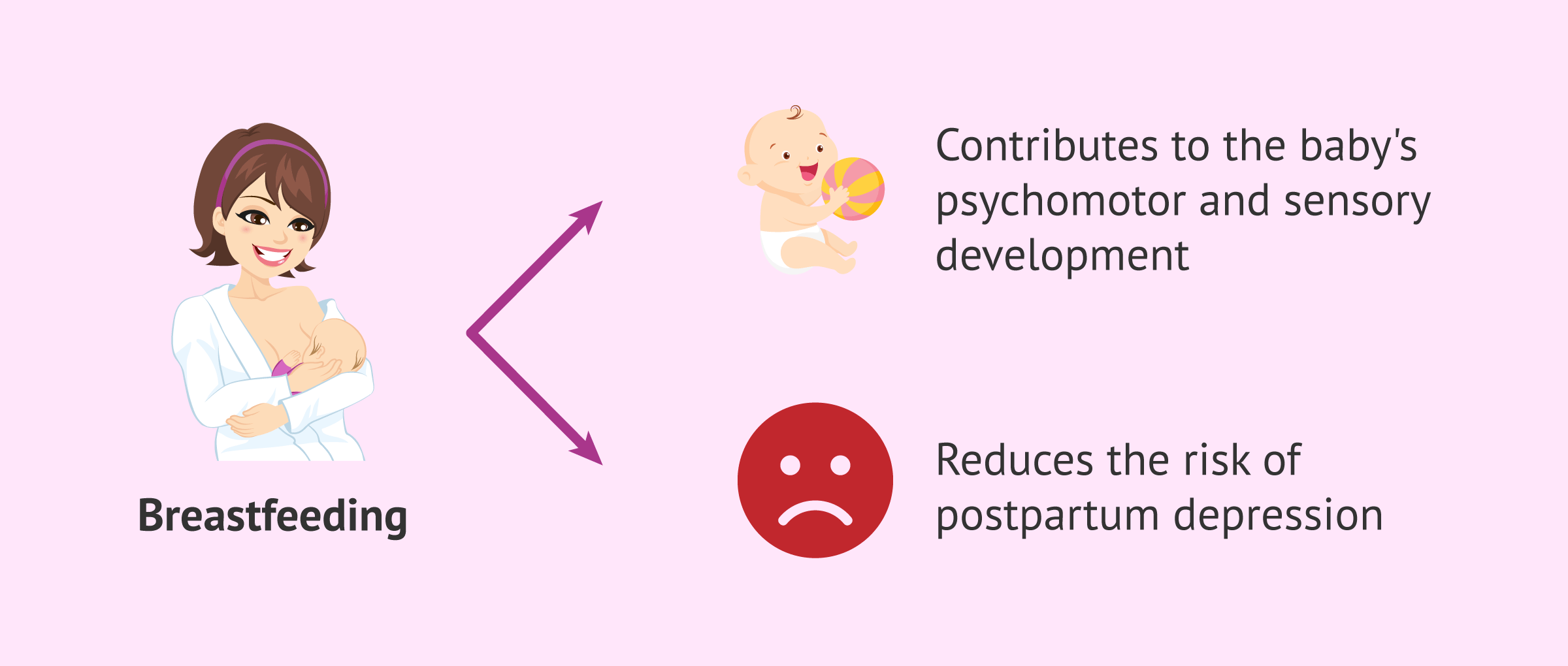Breast milk is considered the best food for newborn babies, as it contains all the nutrients necessary for their proper development.
In addition, breastfeeding has many other advantages for both mother and baby. A very special emotional bond is established between them that favors their relationship and self-esteem.
Provided below is an index with the 6 points we are going to expand on in this article.
- 1.
- 1.1.
- 1.2.
- 1.3.
- 1.4.
- 1.5.
- 2.
- 2.1.
- 2.2.
- 2.3.
- 2.4.
- 3.
- 3.1.
- 3.2.
- 3.3.
- 3.4.
- 3.5.
- 4.
- 5.
- 6.
Benefits for the baby
The World Health Organization (WHO) recommends exclusive breastfeeding for all infants for at least the first 6 months of life and preferably up to 2 years of age with complementary feeding.
Breast milk has multiple benefits for newborns. The following are the most important ones.
It is very nutritious
The composition of breast milk is very complete and adapts to the baby's needs according to the stage of growth.
- Colostrum
- is the milk secreted during the first few days after delivery. It is yellowish in color and has a high protein content to meet the demands of the newborn. In addition, it contains the secretory immunoglobulin A that provides the baby with defenses in its digestive system.
- Mature milk
- contains the ideal combination of nutrients (carbohydrates, vitamins, proteins, minerals and fats) dissolved in a high water content. These nutrients are easily digested by the baby's digestive system, which reduces the risk of gas, diarrhea or constipation. In addition, the composition of milk changes as the baby grows and adapts to its metabolic needs.
If you want to learn more about this topic, you can continue reading here: Did you know that there are several types of breast milk?
Protects against infections
Breast milk contains antibodies from the mother that will help the baby fight infections from viruses and bacteria.
In this way, breast milk extends the period of natural immunity and contributes to the development of the baby's immune system.
Another advantage of breast milk is that it also reduces the predisposition to suffer from respiratory diseases and allergies: asthma, ear infections, allergic reactions to food, etc.
Overall, breastfed infants have fewer infections and are hospitalized less than formula-fed infants.
On the other hand, breast milk is especially beneficial for premature infants, as its components help to reduce the incidence of many disorders.
It has different flavors
The taste of breast milk changes depending on the mother's feeding and this helps stimulate the baby's sense of taste.
It may also happen that the baby notices a taste that is too strong and reacts with crying or irritation. Therefore, it is important for the mother to monitor her diet and learn to identify foods that the baby does not like.
Normally, vegetables are the foods that most influence the taste of breast milk. For example: cauliflower, asparagus, artichokes, onions, red radishes, raw peppers, garlic, leeks, etc.
Mother-baby bonding
The direct contact between mother and child during breastfeeding establishes a very strong emotional bond that will help them to have a greater trust and good relationship in the future.
Children who have been breastfed have greater self-confidence and self-esteem than those who are bottle-fed.
In addition, exclusive breastfeeding contributes to the psychomotor and sensory development of these babies.
On the other hand, the secretion of oxytocin during lactation causes a feeling of well-being in the mother while breastfeeding, which makes her enjoy this moment even more and reduces the risk of suffering from postpartum depression.
Other benefits
In addition to all of the above, breast milk offers other advantages for newborn babies:
- Reduces the risk of obesity or overweight problems.
- Decreases the risk of sudden infant death syndrome (SIDS).
- Decreases the risk of developing childhood diabetes or celiac disease.
- It favors the correct formation of the facial structure, since sucking helps the development of the jaw and teeth, and prevents language disorders.
- In general, it contributes to maintaining good health throughout life.
Benefits for the mother
Breastfeeding the baby also has many short- and long-term benefits for the mother.
On the one hand, breastfeeding contributes to rapid postpartum recovery and, on the other hand, helps prevent the development of diseases such as cancer or osteoporosis.
Below, we will further detail these and other benefits of breastfeeding for the mother.
Size recovery
The high caloric intake during lactation helps women lose weight naturally and quickly.
Approximately 450 to 500 calories a day are expended by breastfeeding. In addition, oxytocin secreted due to the infant's suckling causes contractions in the uterus that help it to shrink and return to normal sooner. Oxytocin also promotes the elimination of lochia (blood that remains after childbirth).
All this causes women who breastfeed their babies to lose weight and regain their figure more quickly.
Saving time and money
As everyone knows, breast milk is free, which means significant financial savings. On the other hand, formula milk is quite expensive, in addition to the cost of bottles, nipples and other gadgets needed for artificial breastfeeding.
On the other hand, the fact that the baby has less risk of getting sick or contracting infections means fewer visits to the pediatrician, less spending on medication, etc.
In terms of time savings, there is no need to prepare breast milk, go to the supermarket for it or heat and temper it. Breast milk is always available and ready to drink, which is very convenient when you are out and about or during night feedings.
Prevents diseases
Studies show that breastfeeding reduces the risk of breast, uterine and ovarian cancer.
Breastfeeding also helps prevent osteoporosis, cardiovascular disease and urinary tract infections.
Serves as a contraceptive
Lactation is considered to be a natural contraceptive, since the release of the hormone prolactin inhibits follicular development and ovulation.
For this reason, women do not menstruate while breastfeeding.
Nevertheless, it is recommended that women take some form of contraception compatible with breastfeeding if they wish to avoid another pregnancy, as this is not a foolproof method.
FAQs from users
Is the mother entitled to breastfeeding leave?
The maternity leave after childbirth in Spain is 16 weeks. Once this time has elapsed, the mother will have to return to her job, but will be able to enjoy breastfeeding leave until the baby is 9 months old.
Breastfeeding leave consists of one hour's absence from work each day in order to breastfeed. It is also possible to accumulate all the breastfeeding hours and be absent from work for as many days as necessary. It is up to the mother to decide which method she prefers.
On the other hand, some jobs are considered incompatible with breastfeeding, as is the case, for example, with pilots and airline crew members. In this case, the woman will be entitled to a suspension of the contract for risk during breastfeeding, which will end when the baby is 9 months old.
Is it possible to lose weight or gain weight during breastfeeding?
Yes, it is normal to lose weight during breastfeeding, but some women may keep the same or even gain some weight. This depends on diet, exercise and metabolism.
During breastfeeding, it is possible to go on a weight loss diet, but be careful. It is not advisable to start the diet before the baby is two months old, as it can significantly affect milk production. On the other hand, the diet should be very unrestrictive and lose weight slowly. If the weight loss is too rapid, it is possible to release toxins derived from body fat into the breast milk, which is harmful to the baby.
Does breast milk make you fat?
No. Breast milk has the right proportions of carbohydrates, proteins and fats for the proper development of the baby. Moreover, this composition changes as the baby's needs are met.
The same is true for the texture of the milk. At the beginning of the feeding, the milk is more liquid to quench thirst, and then it becomes creamier to quench the baby's appetite.
What kind of immunity does breast milk provide?
Breastfeeding helps babies to prevent infections and diseases during their first months of life, when they have not yet received all the necessary vaccinations. Breast milk contains immunoglobulins, lactoferrin, lysozyme and live lymphocytic cells that confer local and general protection against many bacteria and viruses, such as E. coli, Salmonella, B. pertussis and poliovirus.
Why does breastfeeding cause amenorrhea?
The main reason for the absence of menstruation during lactation is related to suction and blocking of ovarian function.
When the baby suckles, the function of the hypothalamus-pituitary axis is inhibited and therefore no hormones are produced that control ovulation. In this way, the maturation of the egg in the ovary does not take place, nor is progesterone generated. The result of these effects is the absence of menstruation in the woman.

In addition, the levels of the hormone prolactin in lactation are high, which also leads to a maladjustment in the hypothalamus-pituitary axis and causes amenorrhea.
Suggested for you
Despite everything discussed here, the type of breastfeeding is a difficult choice for many mothers. In order to learn more about breastfeeding, we recommend reading on in the following post: Baby feeding: breast milk or bottle?
We make a great effort to provide you with the highest quality information.
🙏 Please share this article if you liked it. 💜💜 You help us continue!
References
Gry Hay, Anne Bergljot Bærug. The benefits of exclusive breastfeeding up to six months. Tidsskr Nor Laegeforen. 2019 May 3;139(9). doi: 10.4045/tidsskr.19.0105. Print 2019 May 28 (View)
Gudrun von der Ohe. Benefits of Breastfeeding. Dtsch Arztebl Int. 2018 Jun 29;115(26):453. doi: 10.3238/arztebl.2018.0453a (View)
Kathleen M Krol, Tobias Grossmann. Psychological effects of breastfeeding on children and mothers. Bundesgesundheitsblatt Gesundheitsforschung Gesundheitsschutz. 2018 Aug;61(8):977-985 (View)
Luiz Antonio Del Ciampo, Ieda Regina Lopes Del Ciampo. Breastfeeding and the Benefits of Lactation for Women's Health. Rev Bras Ginecol Obstet. 2018 Jun;40(6):354-359. doi: 10.1055/s-0038-1657766 (View)
FAQs from users: 'Is the mother entitled to breastfeeding leave?', 'Is it possible to lose weight or gain weight during breastfeeding?', 'Does breast milk make you fat?', 'What kind of immunity does breast milk provide?' and 'Why does breastfeeding cause amenorrhea?'.







